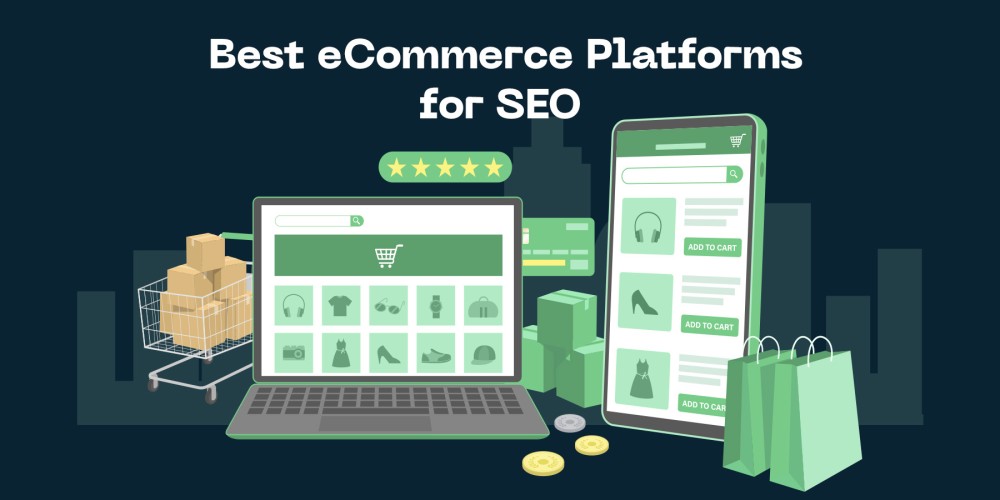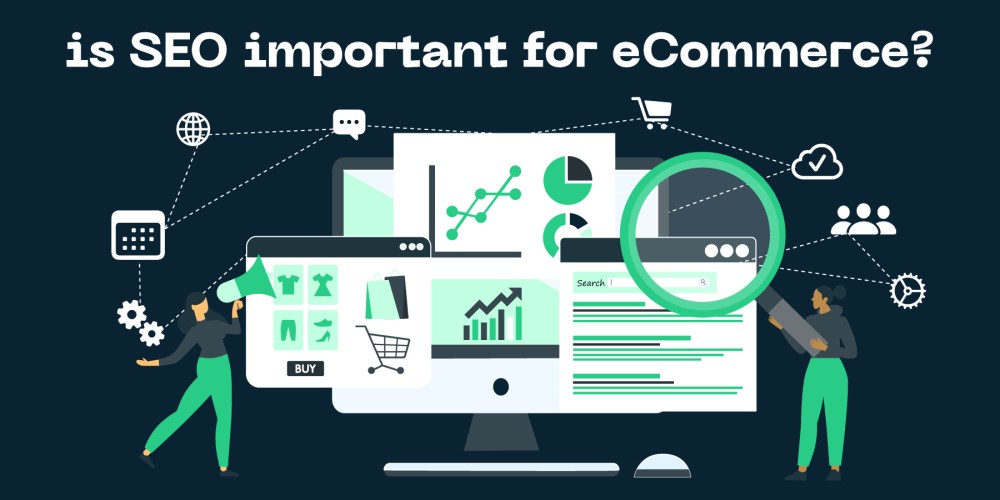Best Ecommerce Platforms for SEO in 2025

Key Takeaways
- Choosing the right ecommerce platform is foundational to building an SEO strategy that drives scalable, sustainable growth.
- Shopify, BigCommerce, WooCommerce, and Adobe Commerce lead the market in SEO capabilities, depending on business size and technical needs.
- Mobile optimization, site speed, customizable SEO controls, and built-in blogging are non-negotiable features for high-performing SEO in 2025.
- Platform choice should align with business size, technical resources, and long-term growth goals — not just short-term convenience.
Choosing the right ecommerce platform is no longer just a technical decision — it's a direct investment in your brand’s long-term growth. In 2025, SEO remains one of the highest-leverage channels for customer acquisition, with organic search often outperforming paid campaigns in both cost-efficiency and lifetime value.
Yet, achieving strong SEO performance isn’t just about content or backlinks. It starts with the foundation: your platform.
The ecommerce platform you select sets the parameters for how easily — and effectively — you can execute SEO strategies at scale. From mobile optimization and site speed to URL control and crawlability, your platform either enables or limits your ability to compete in search rankings.
As competition intensifies and acquisition costs continue to rise, making a strategic choice about your ecommerce infrastructure is critical. The brands that prioritize SEO at the platform level will be the ones that scale faster, spend less on paid traffic, and own more customer relationships — organically.
Key Factors When Choosing an Ecommerce Platform for SEO
When evaluating ecommerce platforms for SEO performance, it’s critical to focus on the foundational features that directly impact rankings, visibility, and user experience. Here are the non-negotiables in 2025:
Mobile Optimization
With mobile commerce continuing to dominate, search engines now prioritize mobile-friendly sites in their ranking algorithms. Your platform must offer fully responsive designs, seamless mobile navigation, and mobile-first site architecture to ensure both high rankings and a frictionless shopping experience.
Site Speed
Speed is a major ranking factor — and a key driver of conversion rates. Platforms that offer built-in speed optimizations, such as fast hosting, image compression, and content delivery networks (CDNs), create a measurable advantage in both SEO and customer satisfaction.
Customizable URLs & Meta Tags
Full control over your URLs, page titles, meta descriptions, and alt tags is essential for optimizing pages around target keywords. Look for platforms that allow easy customization without requiring deep technical expertise, empowering your team to align SEO efforts with marketing campaigns in real time.
Built-in Blogging Capabilities
Content marketing remains a core SEO strategy. Platforms with integrated blogging tools make it easier to publish, optimize, and distribute valuable content — enabling your brand to capture informational keywords and drive top-of-funnel traffic organically.
Indexing & Crawl Control
Precise control over robots.txt files, sitemap generation, canonical tags, and noindex directives ensures search engines can efficiently crawl and index your site. This is critical for avoiding duplicate content issues and preserving the authority of your most important pages.
SSL Security
SSL encryption (HTTPS) is a confirmed ranking factor and a baseline expectation for users. Platforms must offer SSL certificates out of the box to protect customer data, boost trust signals, and support your SEO efforts.
Comparison of Leading Ecommerce Platforms for SEO
Choosing the right platform isn't just about features — it’s about aligning technology with your growth strategy. Each ecommerce platform offers unique strengths (and trade-offs) that can either accelerate or constrain your SEO performance.
For decision-makers, understanding these differences is critical. A platform that suits a small startup may fall short for a scaling brand focused on multi-market expansion. This comparison provides a clear snapshot of which platforms best fit your business model and SEO ambitions.
Here’s a high-level view:
Deep Dive Into Each Platform’s SEO Capabilities
Shopify
Key Strengths:
- Easy-to-use SEO tools with editable meta tags, alt text, and customizable URLs
- Mobile-optimized, fast-loading themes by default
- Integrated blogging platform for content marketing
- Vast app ecosystem (e.g., ConvertMate) to extend SEO capabilities
- SSL certificates included across all plans
Limitations:
- Limited flexibility over robots.txt files
- Fixed elements in URL structures (e.g., mandatory "/collections/" and "/products/" paths)
Best Suited For:
Small to mid-sized businesses seeking fast deployment, user-friendly SEO management, and scalable growth without heavy technical overhead.
BigCommerce
Key Strengths:
- Granular control over SEO settings (robots.txt, sitemaps, canonical URLs)
- Fast, scalable hosting with built-in security and site speed optimization
- Fully customizable URLs and meta fields without the need for add-ons
- Strong out-of-the-box SEO performance without heavy reliance on third-party apps
Limitations:
- Smaller app marketplace compared to Shopify
- Slightly steeper learning curve for non-technical users
Best Suited For:
Growing businesses and mid-market brands that want more technical SEO control without building everything from scratch.
WooCommerce
Key Strengths:
- Full flexibility leveraging WordPress SEO plugins like Yoast and Rank Math
- Total control over URL structures, metadata, and on-page SEO elements
- Native blogging capabilities through WordPress integration
- Customizable architecture for advanced SEO needs
Limitations:
- Requires self-hosting and technical setup
- Ongoing maintenance responsibility falls on the brand or agency
Best Suited For:
Content-driven, SEO-first brands with technical resources, looking for full customization and control over their ecommerce experience.
Adobe Commerce
Key Strengths:
- Enterprise-grade SEO features including advanced indexing, canonical tag management, and schema markup capabilities
- Full customization of site architecture, metadata, and technical SEO elements
- Built to handle large, complex product catalogs across multiple markets
- Huge variety of Magento Extensions to customise default features
Limitations:
- High implementation and maintenance costs
- Requires significant technical expertise or agency support
Best Suited For:
Large enterprises or global brands managing complex operations, multiple storefronts, and sophisticated SEO strategies.
Wix
Key Strengths:
- Simple and intuitive SEO setup for beginners
- Customizable meta tags, titles, and URLs
- Mobile-responsive templates out of the box
- Built-in SSL and automatic sitemap generation
Limitations:
- Less scalable for growing, large catalog stores
- Limited control over more advanced SEO elements (e.g., robots.txt editing)
Best Suited For:
Small businesses or startups prioritizing ease of use, fast launch timelines, and basic SEO readiness.
Volusion
Key Strengths:
- User-friendly interface with basic SEO tools (301 redirects, mobile optimization)
- Simple setup for smaller product catalogs
- Mobile-responsive themes for better user experience
Limitations:
- No built-in blogging capabilities
- Limited control over advanced SEO configurations like meta data structure
Best Suited For:
Small to mid-sized stores that need basic ecommerce SEO functionality without complexity or major content marketing needs.
FAQs
1. Why does platform choice matter so much for SEO?
Your ecommerce platform determines how easily you can implement SEO best practices like mobile optimization, site speed improvements, URL customization, and technical SEO controls — all critical for organic growth.
2. Which ecommerce platform is best for small businesses focused on SEO?
Shopify and Wix are excellent choices for small businesses, offering easy-to-use SEO tools, mobile optimization, and fast deployment without heavy technical demands.
3. Is WooCommerce a good option for SEO-focused brands?
Yes — WooCommerce offers the highest level of SEO flexibility when paired with WordPress plugins like Yoast or Rank Math. It’s ideal for brands prioritizing content marketing and complete customization.
4. What platform is best for large enterprises with complex SEO needs?
Adobe Commerce (Magento) is built for large-scale operations, offering advanced technical SEO controls, global scalability, and custom architecture options — but it requires significant investment and expertise.
5. How important is mobile optimization for SEO in 2025?
Critical. With mobile-first indexing now the standard for Google, your platform must offer responsive designs and mobile-optimized performance to rank competitively.
6. Can I scale SEO effectively on platforms like Wix or Volusion?
Wix and Volusion are best suited for smaller operations. While they offer basic SEO capabilities, scaling complex SEO strategies (especially for large catalogs) is more challenging compared to Shopify, BigCommerce, or WooCommerce.
7. How does ConvertMate help ecommerce brands with SEO?
ConvertMate automates and scales key SEO tasks — like content optimization, structured data enhancements, and conversion-focused page updates — helping brands accelerate organic growth without adding workload.
Conclusion: Which Platform Is Best for SEO in 2025?
There’s no one-size-fits-all answer — the best ecommerce platform for SEO in 2025 depends entirely on your business size, technical resources, and long-term growth strategy.
Here’s the breakdown:
- Shopify remains the top choice for small to mid-sized businesses seeking simplicity, scalability, and strong built-in SEO features with minimal technical complexity.
- BigCommerce is ideal for growing brands that require more control over technical SEO elements without building a platform from the ground up.
- WooCommerce is the best fit for content-driven, highly customized stores that prioritize full flexibility and have the technical expertise to manage it.
- Adobe Commerce (Magento) is unmatched for large enterprises needing enterprise-grade SEO capabilities, custom architecture, and global scalability — with the resources to match.
- Wix is a strong starter platform for small businesses prioritizing ease of use, fast setup, and foundational SEO capabilities.
- Volusion fits smaller to mid-sized businesses that need basic SEO functionality but do not require complex content marketing or technical customization.
When selecting your ecommerce platform, align your choice with three core factors:
- Business Size: How complex is your product catalog and site structure today — and how will it evolve?
- Technical Expertise: Do you have (or plan to have) the resources to manage customization and optimization internally or externally?
- Growth Goals: Are you building for rapid scaling, multi-channel dominance, or niche market leadership?
Choosing the right platform today means building a foundation that won’t just support your SEO strategy, it will drive it.
Looking to future-proof your ecommerce SEO strategy in 2025 and beyond?
ConvertMate helps leading brands optimize smarter, faster, and at scale — unlocking more organic traffic, higher conversions, and sustainable growth.
Start your free 7-day trial today and see how ConvertMate can power your SEO advantage — no commitment required.



